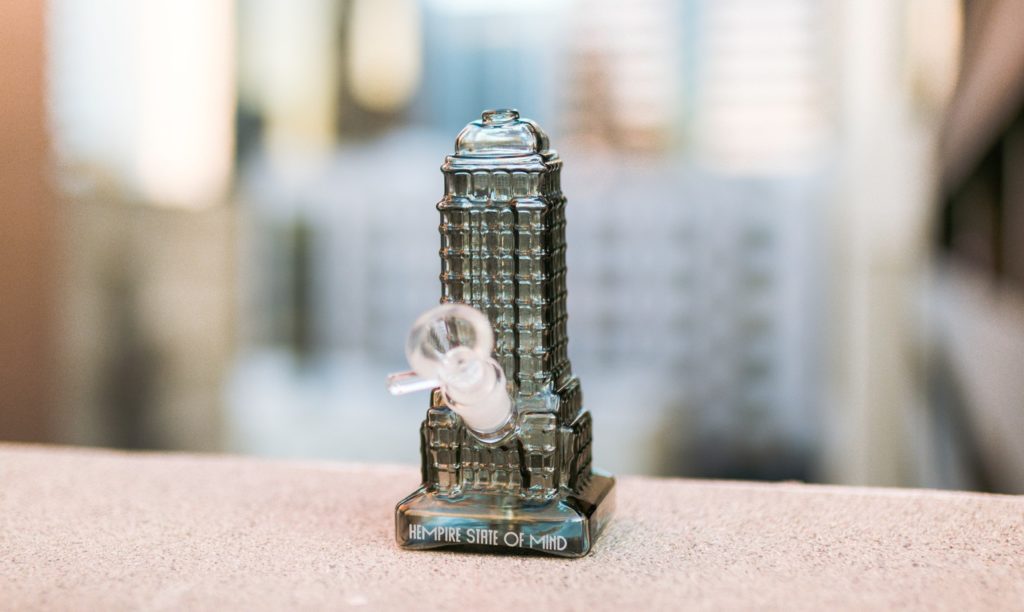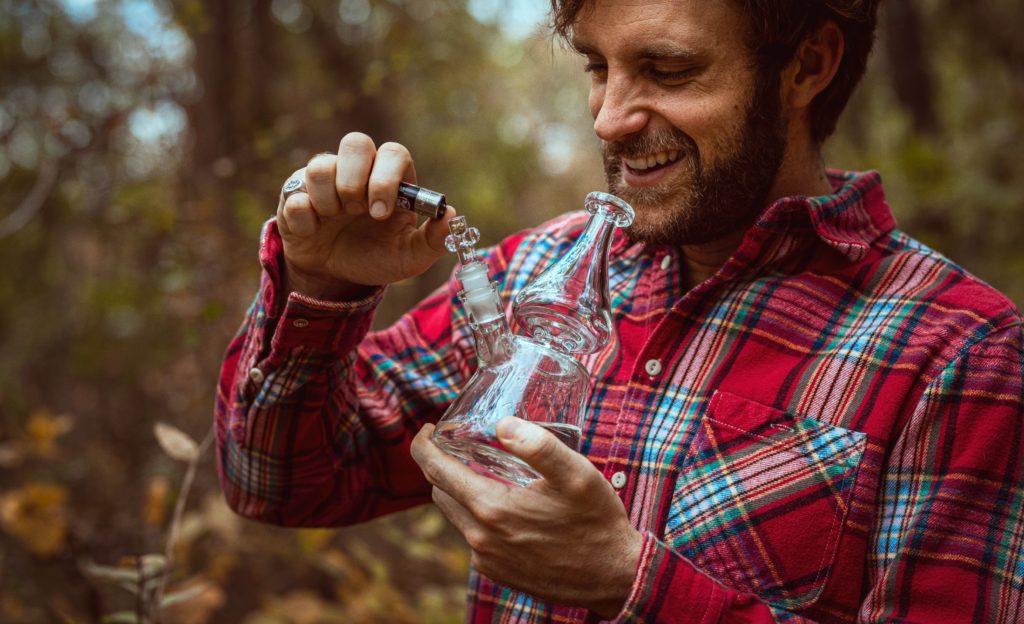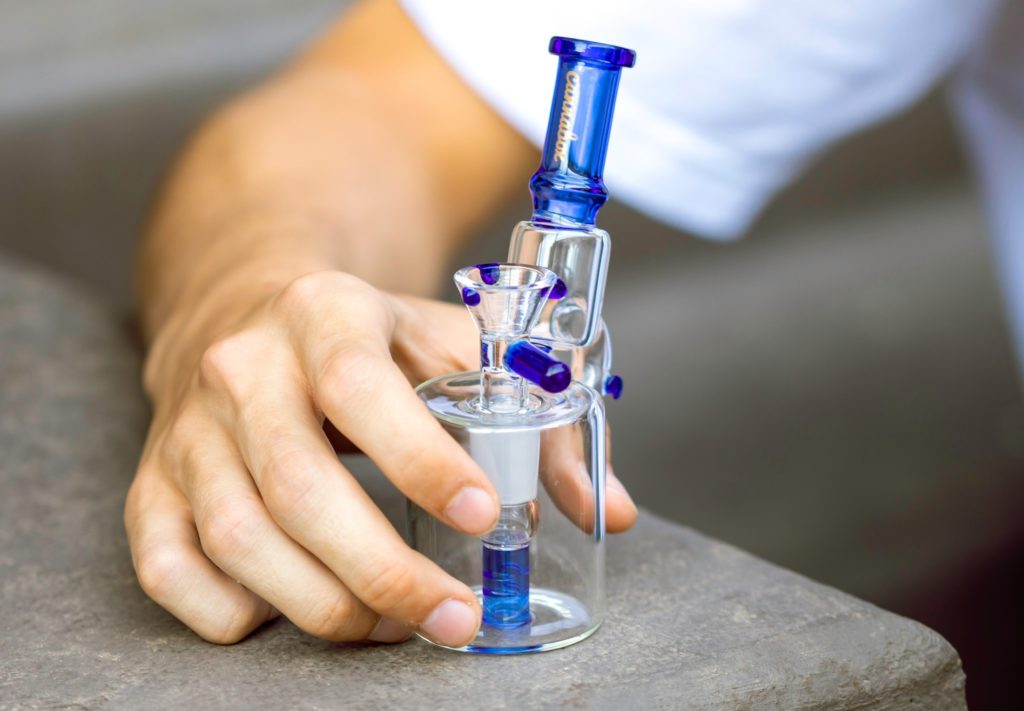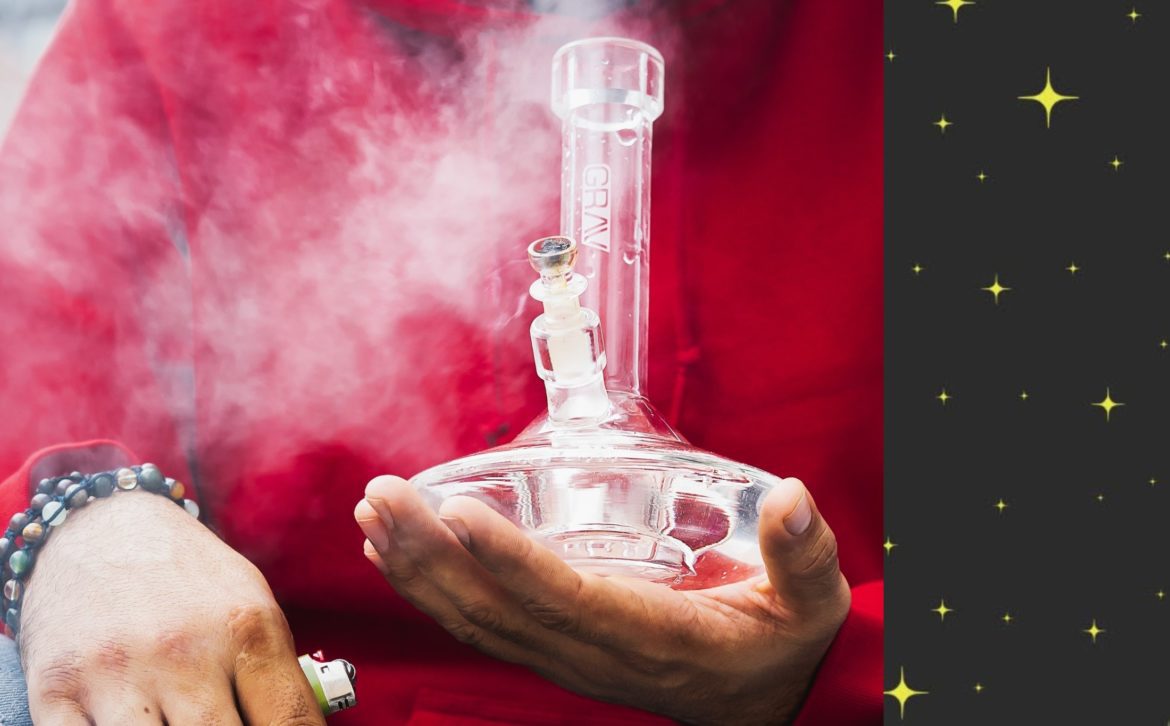Bongs: What Are They and How Do They Work?
As cannabis becomes legal throughout the country, more and more people are giving it a try for themselves and discovering all the great relaxation and social benefits that smoking offers. That’s great. But it also means we have a whole bunch of new weed fans who don’t know how to correctly use bongs.
Nothing is worse than a well-meaning newbie trying a bong for the first time and breaking the glass since they don’t know the right technique. If you’re worried about being this newbie… don’t fret! You’ve come to the right place.
Here is everything you need to know about bongs, including what they are and how they work. Let’s get started with the basics.
What is a bong?
If you’re new to cannabis, no worries – bongs are really easy to understand. In a nutshell, bongs are simple devices you can use to smoke cannabis, although you can also use them to smoke tobacco and other crushed herbal substances.
The key to a bong is that it uses water as a cooling element. To get the cannabis smoke into your lungs, you have to burn ground cannabis flower. Normally, the smoke from burning flower would be too hot to take into your lungs, but the design of a bong allows consumers to cool the smoke down so your experience is more enjoyable.
Although each bong’s basic design is the same, there are tons of different bong varieties and styles to choose from. This can make it a little intimidating for beginners. But if you keep reading, you’ll learn even more about bongs and how to choose which bong is right for your needs.
History of bongs
Bongs have been around for a long time. There’s some evidence that smoking pipes have been around for close to 2,500 years.
One of the earliest waterpipe devices has been dated back to 2,400 years ago. These solid gold “bongs” were used by Scythian chiefs who dwelt in what would now be modern-day Russia. However, early bongs or equivalent devices have also been found in archaeological sites in Africa, Asia, and even central America.
There’s also some evidence that more complex water pipes were created in Ethiopia. Archaeologists found 11 buried bongs that utilized the underground to create an effective cooling system. These early bongs were made of both pottery and animal horns. It just goes to show you how creative and innovative humans have been throughout history.
Fun fact: the word “bong” is thought to have come from the Thai word “baung”, which is a type of cylindrical and wooden water pipe made from bamboo. It’s easy to see how the term evolved to its current use. Modern bongs, despite being made of glass or other materials, serve essentially the same purpose.
“Baungs” were originally developed in the 16th century, which is when the English begin interacting with the Thai people more regularly. Perhaps this is why bong evolved into the now-modern word for water pipes.
The Silk Road led to the proliferation of the bong across the world. They made it as far as China and became treasured devices for Chinese royalty and nobles, who often appreciated smoking as a recreational activity. During the Qing Dynasty, both royals and common folk also enjoyed using water pipes to smoke tobacco. Bongs became so popular in China that Empress Dowager Cixi is said to have been buried with a few of her favorite water pipes after her death in the 1900s.
The modern bong
The actual inventor of the modern-day glass water pipe is a bit difficult to pin down. But we do know that legendary glassblower Bob Snodgrass was responsible for the development of at least one modern-day waterpipe in the 1960s and 70s.
Snodgrass settled in Eugene, Oregon when he discovered fuming, a process that used gold and silver to color different types of glass. Snodgrass developed the special fuming technique that gives modern-day bongs their characteristic, curling smoke in cool colors. Part of this aesthetic appeal is what helped bongs to spread throughout America and, eventually, the rest of the world.
Unfortunately, the government interfered with the spread of modern bongs for some time. The US government spent over $12 million in an attempt to completely ban the sale of bongs. It took many years for bongs and smoking to become socially acceptable again. To this day in prohibited states, people are forced to call bongs “water pipes” when purchasing them from smoke shops.
Modern-day bongs can be found nearly anywhere—from convenience stores to smoke shops—and are most often made of glass. However, you can also find silicone water pipes that are a little more durable and oftentimes more affordable. Glass is still regarded as the most high-quality material for bongs. Whatever material you go with we’ve got 6 easy steps to keep them sparkling clean.
Bongs have also evolved into different types of water pipes. One great example is a dab rig, which is technically a type of bong you can use for cannabis concentrates, like wax, oil, and rosin. Taking a dab is similar to smoking flower out of bongs, with a slightly different procedure. It’s exciting to think about where bongs will go in the future.

What are the parts of a bong?
To fully understand what a bong is and how it works, you’ll need to have a good understanding of each individual part. Let’s break down the major parts of a bong one by one.
Bowl
The bowl or bowl attachment is a straightforward but critical piece. As its name suggests, it’s where you will pack your various dry herbs, like crushed flower or tobacco.
Bowls are usually made of tough materials like quartz, glass, or borosilicate glass. Borosilicate glass is the same type of glass used in scientific experiments since it is not as affected by temperature changes, which makes it more durable overall.
Bowls can also be found in a wide variety of types. Most bowls are wide and deep so you can pack more ground-up flower into the bowl. They should be of medium depth in order to heat the bowl evenly to produce smoke. Bowls are also designed to fit a wide range of stems, affording extra versatility and ease of use.
It’s important to know what size of bong you have so you can find a bowl attachment that fits tightly in your piece. Bowl attachments are referred to as “male” or “female,” which means they either slide into or receive the glass stem. Standard bowl sizes are 10.5, 14, and 18 mm. Keep in mind that “female”-sized bowls are wider, so they’re often better for cooling down vapor more quickly.
In addition to finding bowls of typical materials, you can sometimes locate custom glass bowls that are designed for artistic effect. Ultimately, there are thousands of different glassblowers and bowls to pick from. We’d recommend going with something simple and durable if you are just getting into smoking for the first time.
When choosing a bowl attachment:
- Make sure you don’t pay too much – you can probably find a good bowl for between $15 and $25.
- Deeper bowls can hold more cannabis. Depending on what you need, the deeper bowl can improve your smoking experience.
- Go for borosilicate glass or tougher. Don’t use regular glass, as it doesn’t last long enough and may crack under the extreme temperature fluctuations.
- Try to find a bowl that has a notch on the side to make it easier to grip.
Downstem
The downstem is the next major architectural piece of the bong. It’s attached to smaller pieces called slides, which are small pieces of glass that connect the down stem to the bong joint.
The purpose of the downstem is to carry smoke produced from the bowl to the water basin at the bottom of the bong. In doing so, the downstem cools the smoke through a scientific process called diffusion.
Technically speaking, there are both diffused downstems and regular downstems. Diffused downstems will have multiple slits at the bottom that cause the smoke to be filtered at multiple points. Therefore, the smoke is separated into different bubbles and cools more quickly. Regular downstems with one opening can still work but are not as efficient when it comes to cooling.
Some of the most complex downstems may have dozens of slots or holes. Typical downstems will have between 3 and 12 slots, which should be fine for your purposes.
When choosing a downstem for your bong:
- Go with one that has a diffused downstem if possible, as your smoking experience will be smoother.
- Fortunately, most off-the-shelf bongs will come with a downstem right off the bat so you shouldn’t need to worry about your downstem fitting perfectly.
- Try to locate one that comes with a polished glass joint. Polished glass joints allow the bowl to fit more tightly into the downstem. Ground glass joints also work, but there will be less tight airflow.
Carb
The carb or carburetor is a hole at the side of the base. It brings in clean airflow and allows you to clear the tube of smoke before another hit. This prevents you from having to lift your bowl totally away from your downstem or otherwise take the pipe apart.
Carbs are usually designed as either pulls or slides that you can manually adjust whenever you need to clear the bong. Some carbs are also just holes and you have to use your finger to keep smoke inside while you are taking your hit, then remove your finger when you want to clear the tube.
Base
The base is the very bottom of your bong. It’s the widest piece and should be able to support the full height of your bong. Strong bases provide the overall rig with superior durability. In addition, the base is where the water for the bong is kept. The bigger the base, the more water you can use and the bigger bowls you can support.
However, keep in mind that larger bases mean that your overall bong will also be heavier, meaning it’ll be harder to travel with or take to a friend’s house.
When picking a base:
- Go for a base that is made of thick, durable glass. If the base breaks, it could render your bong obsolete.
- Find a base that looks to be about twice as thick as the primary tube, as this should result in good proportional durability.
Tube
Tubes are the pieces that carry smoke from the base of the bong to the mouthpiece, which is where you inhale the smoke. Tubes are the second-largest piece of the bong and are often the longest portion as well.
Naturally, tubes come in a wide range of shapes and sizes. You’ll often find bongs with straight tubes, although you can also find tubes with curves or special angles for artistic or handheld purposes. In general, thicker tubes are usually better since they will be more durable.
Taller tubes provide room inside the bong for additional pieces like percolators. Plus, they give the smoke more time to cool before it reaches your mouth. But keep in mind that taller tubes also make your bong more top-heavy, which can make it harder to handle.
When choosing a tube for your bong:
- Try to find one with a thickness of 2 to 5 millimeters
- Aim for one made of durable glass or another material

How to use a bong
Now that you have a good understanding of all the pieces of a typical bong, you can start using it. Learning how to use a bong is something you can only really grasp with experience. It’s normal for your first smoking attempts to be a little clumsy, but the good news is that your smoking experience will become better as time goes on. Follow these guideposts, and you will become more proficient at using your bong in no time.
Let’s break it down.
Fill your bong
Next, fill the bong with water. Be sure to use room temperature water instead of extremely hot or cold water. If you use extremely hot or cold water, the smoke could cause a rapid temperature change and weaken the glass or other material of your bong. In the worst-case scenarios, it could cause a crack and lead to injury.
You can fill your bong’s base through the mouthpiece or the downstem depending on which seems easier. Make sure that you fill your bong with enough water that it covers the percolator or the down stem, but leave enough room so that the tube still has plenty of space.
Not sure whether you have filled your bong with enough water? You can do a simple test by inhaling. If you hear a sound like you’re blowing bubbles in a drink, you’ve got the right amount of water.
Pack the bowl
Pack your bowl with dry herbs like crushed cannabis flower or tobacco. Use a grinder to crush the flower into fine pieces.
You can also use a special pipe screen accessory to pack it on more tightly. This prevents any of the crushed flower from being pulled through and allows you to get a more intense high experience with each hit. You’ll want to be careful not to pack your bowl too loosely. Doing this could cause the crushed flower to burn unevenly, or be sucked through the bowl into the water.
At the same time, don’t pack everything in too tightly. This will restrict airflow and prevent you from getting that sweet smoke into the bong itself. A medium pack is just right.
Attach your bowl
Now it’s time to put your bowl into the downstem. Make sure that the downstem is already in your bong joint and is properly secured. Of course, you should also make sure that no water gets into the bowl, as this can make lighting the crushed flower more difficult.
Light the bowl
Now comes the fun part! After packing and attaching the bowl and filling the base with water, you can finally start smoking. Use a lighter to light the corners of your cannabis bowl to start. Fun fact: this is called “cornering the bowl” since it’s a very common technique, and it preserves the taste of the cannabis for another hit.
By lighting the corners of your bowl, you’ll make your herbs last longer and be able to enjoy a recreational experience instead of burning through your entire bowl too quickly. Furthermore, lighting the corners helps to keep your bowl lit throughout your smoking session. Any flames should very slowly progress to the middle of the pack and stay lit the entire time.
Take a breath!
As you light the bowl, put your mouth on the mouthpiece and start inhaling. Smoke should start coming up almost immediately.
For proper technique, make sure that you create a vacuum between your mouth and the bong and between the joint and the bowl. This leaves no gaps for the smoke to go and will improve your smoking experience, plus make suction a lot easier.
Fill the chamber
If you’re a beginner, you can make things a little easier by filling your bong with smoke at first and taking a momentary break as you cover the mouthpiece. Then inhale when you’re good and ready. This will prevent you from taking too large of a hit at first and coughing up a storm.
The good news is that after taking your first few breaths, the bong’s chamber should be filled with smoke and future hits will be easier to enjoy.
Pull your bowl
When you’re ready to take your first hit, pull your bongs’ bowl from the slide and inhale simultaneously in order to clear the chamber. You don’t have to pull the entire slide out. In fact, we recommend against it since it increases the chance of accidentally breaking the slide and downstem or getting your herbs wet.
If it’s your first time, don’t worry if you cough a little bit! It’ll take a few puffs for your lungs to get used to the experience. Taking a deep breath and enjoying your hit while removing the bowl might seem clumsy or difficult at first. As with everything about smoking, you’ll become better at it as you gain more experience.
When taking a hit…
Be careful if it’s your first time since it’s tough to accurately gauge how much smoke your bong is holding, especially if the chamber is pretty large. Don’t worry if you have to separate your hit into a few different breaths or “rips”. It’s always better to take too little than take too much smoke, which can cause coughing. And if still feels too rough taken in bits try one of the different types of bong percolators.

Different types of bongs
Bongs have been around for so long, there are tons of different types to pick from. It can be intimidating for beginners, especially if you don’t know what makes different bongs distinct from one another.
Let’s break down the different types of bongs you’ll see in shops or at your friends’ homes.
- Beaker base bongs are the quintessential basic bong. They have a triangular beaker-style base and a simplistic design. These bongs are favored among cannabis consumers since they have plenty of room for accessories like percolators.
- Straight tube bongs are simple and reliable. They tend to have a smaller base than beaker bongs. But they also can come with percolators and diffusing downstems.
- Percolator bongs are beaker-shaped and they have special mechanisms inside that further filter and cool the smoke. There are many types of percolators but they all have the same end result-the smoothest possible hit you’re ever going to get from flower.
- Multi-chamber bongs come with several chambers that transfer the smoke between one another to cool it for a superior smoking experience. These bongs are oftentimes more expensive.
- Bubblers are smaller, portable bongs that are easy to carry around and that come in a wide range of aesthetic designs. Often using a mouthpiece, they look like a combination of a bong and a cannabis pipe.
- Zongs are named for their famous zigzagging shapes. This is more than just an aesthetic preference, as the Z shape can help to work as an ice catch and cool down smoke even further before it reaches your mouth.
- Inline bongs feature intricate designs and strong bases. They also have special in-line percolators. These are horizontal attachments built straight onto the glass, which technically makes them multi-chamber bongs as well. These provide some of the smoothest hits you’ll ever experience, but they are more expensive.
- Dab rigs are new types of bongs that can be used to smoke concentrates. Called dabs, these concentrates include rosin, cannabis oil, or wax made out of cannabis flower. These are similar to flower bongs, but with larger, specialized quartz bowls.

Benefits of using a bong
Bongs are great inventions, but it’s also true that you can smoke cannabis with a joint or through other methods. So what are the benefits?
Here are some of the most common benefits of using a bong.
- For one, bongs produce much smoother hits. Since they use water to cool the smoke before it reaches your lungs, you’ll enjoy a more comfortable and oftentimes smoother smoking experience. Cooler temperatures and less lung irritation is always a good thing.
- Bigger hits are possible, another benefit of bongs. Simply put, the more smoke you transfer to the bong before taking a hit, the bigger hit you’ll experience compared to a dry herb pipe.
- Lastly, bongs allow for some personalization. All joints pretty much look alike, but you can get a customized bong that suits your personality or smoking style. It’s a great way to get deeper into the cannabis hobby.
All in all, bongs are great smoking tools and accessories for more reasons than one. That’s probably why people have been using them for thousands of years.
Risks of using a bong
In general, using a bong is not itself riskier than other ways of consuming cannabis. Studies have found that smoking any kind of substance could be harmful if you do it incorrectly (for example, smoking overheated smoke that scalds your lungs). While cannabis smoke is less harmful than tobacco smoke, it still contains plant material which is a risk to combust.
In places where cannabis is still prohibited, glass is an additional legal risk of a charge for “paraphernalia.”
Bongs can also be a little risky if you drop them since they are made of glass. Glass is a physical hazard, so you should be careful never to hit your teeth with your bong or drop it on a hard surface.
Furthermore, cheap bongs made of materials like plastic can be harmful. Many types of commercial plastics are created with BPA and other unnecessary, synthetic chemicals that can leak into the smoke or water. These chemicals have been linked to several negative health effects, like cancer.
You should always look into purchasing and using bongs made with high-quality materials instead of cheap stuff. That’s the best way to limit your risk for side effects and enjoy your smoking experience to the max.
Alternatives to using a bong
Bongs might be the most commonly used smoking tool aside from glass bowls, but rolling joints are a good alternative if you don’t feel like carrying a glass piece around with you all day, especially since glass can be pretty fragile.
Joints and hand-rolled smokes of all kinds are usually a good choice if you are traveling or if you go for a hike and want to enjoy a toke without needing a glass piece.
But there are also other gadgets that work as good mechanical alternatives to bongs. Vapes are becoming super popular, especially among younger consumers. They’re loaded with cannabis concentrate that’s quickly heated and creates a vapor that’s inhaled into the lungs. The big benefit to vapes is that they are portable and safe since they often look like electronic cigarettes. Vapes are also a good option for reducing the amount of combust plant material you inhale.
You might also consider using that hookah you have laying around or looking into a dab rig. These are the glass bongs beloved by experienced cannabis concentrate consumers. Dab rigs are better if you already have some experience using a regular bong and want to increase the amount of THC you intake.
Find cannabis online with Emjay Delivery
Bongs are basic water pipes with designs that are so simple and intuitive, it’s why they’ve stood the test of time. Bongs will be with us for centuries to come as smoking becomes more fully legalized across the country.
Fortunately for you, you can get your hands on a great bong right now by checking out Emjay’s selection of smoking accessories. Even better, we deliver premium weed to people throughout the LA and San Diego area so you never have to go without a hit.
Interested? Contact us today or sign up for our weed delivery service after checking out our shop!
